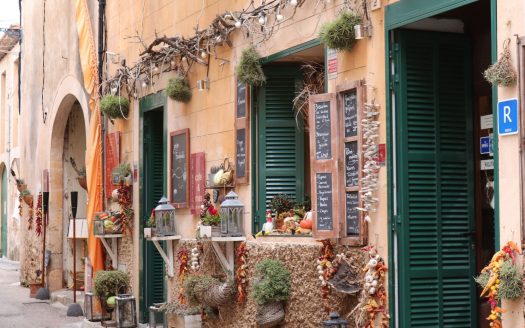The Fractional Way to Dodge the Taxman's Final Dance: A Rather Clever Estate Planning Waltz
Or: How to pass on your slice of the Ibiza villa without the Chancellor getting his grubby mitts on it
There’s something rather deliciously ironic about death and taxes being life’s only certainties, particularly when one can use the former to rather neatly sidestep the latter. Enter fractional ownership – that modern marvel that allows one to own a perfectly respectable slice of a Tuscan villa or Cotswolds manor without the vulgar necessity of purchasing the entire edifice.
But here’s where it gets rather clever indeed: that 1/8th share in your beloved holiday retreat isn’t merely a ticket to sun-soaked terraces and weekend house parties. It’s also a rather elegant solution to what estate planners delicately term “succession planning” – or, as we civilians call it, not letting the government hoover up half your worldly goods when you shuffle off this mortal coil.
The Art of the Strategic Donation
Now, before we get too morbid about mortality, let’s discuss the rather more cheerful business of giving whilst still breathing. Most civilised nations, it transpires, are surprisingly generous about allowing you to bestow gifts upon your offspring without triggering the taxman’s interest – provided you’re not too flash about it.
Take France, that bastion of enlightened fiscal policy. The French, bless them, allow parents to donate approximately €100,000 to each child every fifteen years without so much as a raised eyebrow from the revenue authorities. Coincidentally – and surely this is pure serendipity – this happens to be precisely the sort of sum one might expect to pay for a respectable fractional share in a rather nice property.
Across the Channel, HM Revenue & Customs permits rather more modest annual gifts of roughly €3,500 per recipient, though one can make larger donations provided one survives the subsequent seven years – a period estate planners euphemistically call the “seven-year rule,” though it sounds rather more like a prison sentence.
The Americans, never ones to be outdone in matters of bureaucracy, allow annual gifts of approximately €16,500 per recipient, with a lifetime exemption that would make even a Bond villain blush – currently sitting at a rather robust €12.5 million per individual.
All this info can change without notice (you know the taxman…), so you need to check with a legal specialist in your country regarding inheritance tax laws and also the cost for transferring/changing name on the deed or on your share.
France
You may gift roughly €150,000 every 10–15 years to your children tax‑free. Sounds almost tailored to the average fraction’s value.
United Kingdom
You can give away up to £3,000 per tax year without it being added to your estate—your “annual exemption” Level+5GOV.UK+5Financial Times+5.
You can carry forward any unused amount for one year MP Estate Planning UK.
Small gifts of up to £250 per person in a single tax year are also exempt MoneyWeek+15GOV.UK+15Level+15.
Gifts made out of your normal income—think generous monthly payments—are also exempt, provided they don’t dent your own lifestyle GOV.UK+2Financial Times+2.
Larger gifts (like your chalet share) become a Potentially Exempt Transfer (PET)—if you survive for seven years, it vanishes from your estate’s inheritance tax calculations IRS+15MaPS+15Techzone+15.
So your frugal fraction—say, priced at €150k—could be gifted in stages or via PET rules, neatly sidestepping IHT if you make it to the seven‑year finish line.
United States
You may gift $19,000 per recipient per year (2025) tax‑free. Above that, amounts are applied to your $13.99 million lifetime exemption MarketWatch+5Wikipedia+5Congress.gov+5.
The lifetime exemption remains high at $13.99 million, shielding nearly all domestic homeowners from estate taxes Congress.govTax Advisory Partnership.
Plus, no inheritance tax is levied on recipients—Americans are spared that double trouble FindLaw.
The Fractional Advantage
Here’s where fractional ownership reveals its true genius. Rather than attempting to gift an entire €1.4 million holiday home (which would require either considerable paperwork or an unseemly amount of patience), one can simply transfer that neat 1/8th share worth €150,000. In France, this falls comfortably within the gift allowance. In Britain, with a bit of strategic planning across multiple years, it’s entirely manageable. Even the Americans, despite their modest annual limits, have that rather generous lifetime exemption to fall back upon.
The beauty lies in the mathematics. Traditional property ownership is rather like trying to post a grand piano through a letterbox – theoretically possible, but requiring an awful lot of dismantling. Fractional ownership, by contrast, has already done the dismantling for you, creating neat, giftable parcels that slip through inheritance tax regulations like a well-oiled eel through a fisherman’s net.
The Practical Particulars
The transfer process itself is refreshingly straightforward. Unlike trying to gift half a house (which tends to create all sorts of legal peculiarities), fractional shares transfer rather like stocks or bonds. One moment you own 1/8th of that charming place in Provence, the next moment your darling daughter does – and she hasn’t had to pay a penny in inheritance tax for the privilege.
This is particularly useful for those who’ve had the foresight to purchase multiple fractional shares over the years. Rather than leaving behind a complicated estate that requires selling properties and dividing proceeds, one can simply distribute shares like particularly valuable Christmas presents – except these ones come with infinity pools and wine cellars.
The Long Game
Of course, there’s nothing to stop the truly forward-thinking from playing an even longer game. Purchase fractional shares when they’re young, gift them strategically over the years, and by the time one’s ready for that great property portfolio in the sky, the estate has been rather neatly distributed already.
It’s rather like having one’s cake and eating it too – except the cake is a gorgeous villa in the south of France, and instead of eating it, you’re passing perfectly reasonable €150,000 slices to the next generation without the government demanding its traditional bite.
The French, with their typical Gallic sophistication, seem to have inadvertently created a system where the price of fractional shares aligns rather perfectly with their gift allowances. Whether this is a cosmic coincidence or clever planning by someone rather more far-sighted than the rest of us remains delightfully unclear.
A Toast to Timing
As any good estate planner will tell you, timing is everything – both in comedy and in avoiding inheritance tax. The fractional ownership model simply makes the timing rather more manageable, turning what might otherwise be a logistical nightmare into a series of perfectly pleasant gift-giving occasions.
After all, there’s something rather civilised about being able to say, “Happy birthday, darling – here’s your €150,000 share of the family villa in Tuscany,” rather than leaving behind a will that reads like a tax accountant’s fever dream.
So here’s to fractional ownership: making luxury accessible, portfolios manageable, and inheritance tax avoidance positively elegant. It’s enough to make one almost look forward to estate planning – though let’s not get carried away.
The author wishes to note that while death remains inevitable, inheritance tax need not be quite so certain – particularly with the right property strategy and a decent bottle of wine to celebrate the clever bits.
Check Our Destinations
Ready to own that dream property?
Get in touch with our team to secure your share today.



